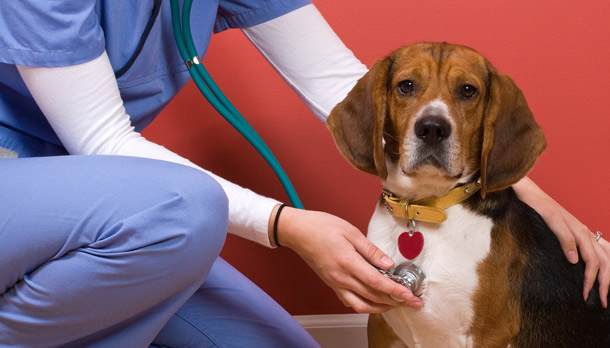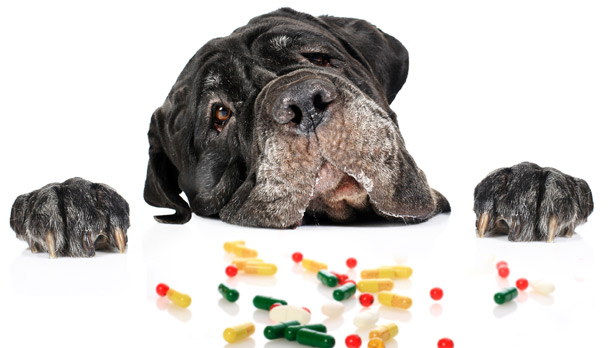Our Blog
LOWERING THE ‘BOOM’: REDUCING PETS’ NOISE SENSITIVITIES
When summer thunderstorms roll in, some pets dive for cover. If your dog or cat is among those terrified by storms or other sudden, loud noises, such as fireworks, there are steps you can take to help reduce your pet’s anxiety.
According to Dr. Kelly Ballantyne, a veterinarian with a special interest in animal behavior, the reason pets are scared of thunderstorms isn’t always clear. One study found that a traumatic experience linked to noise was the likely origin of noise sensitivity in only about a third of pets with these phobias. Other factors that may contribute to noise sensitivities include chronic stress, genetics, neurochemical imbalances, and a change in hearing.
Practicing at the University of Illinois Chicago Center for Veterinary Medicine, Dr. Ballantyne offers behavior consultations to help pets with phobias and other behavioral issues.
She says it is perfectly normal for a pet to be scared by the loud noises and flashes the first time the pet experiences a thunderstorm or fireworks. A pet may react defensively to these high-decibel noises because they probably hurt the pet’s ears, they lack a regular pattern, and it’s difficult to figure out where they are coming from.
It isn’t normal, however, if the animal does not get used to storms, and each thunderstorm is as terrifying as the previous one. Unfortunately, thunderstorms are common, and these frequent stressors can reduce a pet’s quality of life. Addressing your pet’s fears is important for the sake of the pet—not to mention the household objects sometimes destroyed by frightened pets.
Dr. Ballantyne suggests several measures that may help noise-sensitive pets feel a little safer and less frightened during a thunderstorm.
“First, try to make a safe place where your pet can go,” she says. “An interior room with no windows is ideal because it is more sheltered from noise and the flashes of light. Avoid crating your pet unless the pet already feels that the crate is a safe place.”
When pets are already hiding, don’t force them out: that can scare and stress them more. Playing music or increasing the white noise in the house can decrease the perceived amount of noise from the storm.
Your behavior around your pet also plays an important role in managing the pet’s anxiety during a storm. You should avoid either comforting or punishing the pet, and you should stay calm to avoid increasing the pet’s anxiety.
If your dog isn’t too scared, you can try to play with him. Interactive toys, such as a Kong filled with food, can help as well if he is willing to eat.
A pheromone spray for dogs called DAP helps reduce anxiety in some dogs. It can be sprayed on a bandana and tied around the pet’s neck during a storm.
Dr. Ballantyne acknowledges that noise sensitivities can be hard for owners to manage. Sometimes you can do everything right and your pet is still scared of the storms.
“Don’t hesitate to ask your veterinarian for help,” advises Dr. Ballantyne. “If nothing else is working, your veterinarian can prescribe anti-anxiety medication to augment the behavior modification plan.”
Don’t forget that a pet that is scared of thunderstorms will likely have a similar reaction to fireworks. These pets should be given a safe place to hide during the celebration and should never be taken to watch fireworks.
If you have questions about pets’ noise sensitivities, please contact your veterinarian or a veterinary behaviorist.

Dr. Kelly Ballantyne
Veterinarian
IS YOUR PET READY FOR HEARTWORM SEASON?

Thanks to an extremely harsh winter, we may see a decrease in the mosquito population compared to previous years. Still, we must take precautions against heartworm disease. Mosquitoes are the intermediate host of heartworms and are responsible for spreading this deadly disease. Dogs cannot give the disease to other dogs without the aid of mosquitoes. As pet owners, we need to be responsible for protecting our pet’s health by preventing heartworm disease.
Heartworm disease is caused by Dirofilaria immitus. When this parasite is mature, it resides in an animal’s blood vessels very close to the heart, resulting in heart disease and elevated blood pressure. Currently there is only one FDA approved medication that kills the adult worms in dogs, and nothing is available to kill adult heartworms in cats. This is why preventing adult worms is so important.
How does heartworm prevention work?
There are many preventatives on the market: oral, topical and injectable forms. Most preventatives need to be dosed every 30 days. When an animal receives a monthly dose of prevention, the preventative kills any microfilaria (baby heartworms) that an animal may have been exposed to within the last 30 days. That is why dosing every 30 days is so important. Even though transmission of heartworms in the Chicago area during the winter months is unlikely we still recommend year around prevention. Most heartworm preventatives also protect pets from intestinal parasites, which are diagnosed year around and can be passed to humans.
Here at our clinic we recommend Sentinel & Revolution as our primary heartworm preventatives. Sentinel is a dog product that is given orally every 30 days. It prevents heartworms, intestinal parasites (roundworms, hookworms, whipworms), and flea infestations. It is one of the most broad-spectrum preventatives on the market and that is why we currently recommend it over the very popular Heartgard. Revolution is both a canine and feline product. It is topically applied every 30 days. It too is a broad-spectrum preventative. We strongly recommend this for cats, and it is also available for dogs. Ask your veterinarian which option would be best for your pet.
Drew Sullivan, DVM
Veterinarian
PAWS OFF THESE POTENTIAL PET POISONS

I’ve been talking to a lot of clients about the common household items that can be toxic to their pets. According to 2012 data from the Animal Poison Control Center, based in Urbana, Ill., prescription human medication was at the top of the list for the fifth year in a row. The most common meds ingested by dogs and cats include heart medications, antidepressants, and pain medications.
The comprehensive list from the ASPCA website follows:
- Prescription Human Medications – most commonly heart medications, pain medications & antidepressants
- Insecticides – most commonly occurs when cats receive flea/tick preventions & shampoos made specifically for dog use
- Over-the-Counter Human Medications – most commonly over the counter pain medications (naproxen, ibuprofen, and aspirin)
Veterinary Products and Medications - Household Products – soaps, cleaners, batteries, mothballs, glue, antifreeze
- People Food – coffee grounds, xylitol (artificial sweetener often found in gum), grapes, raisins
Chocolate - Plants- Lilies, Marijuana, Sago palm, Tulip, Azalea, Oleander, Castor bean, Cyclamen, Kalanchoe, Yew, Amaryllis, Autumn crocus, Chrysanthemum, English ivy, Peace lily, Pothos, Scheffler
- Rodenticides – most commonly mouse/rat poisons
- Lawn and Garden Products
To help prevent accidental poisonings, keep medicines, household cleaners, pesticides and automotive products stored and out of paw’s reach. Never give any medications or supplements to your pet without first consulting your veterinarian. And always read the label of flea/tick products before applying to your pet. If a product is labeled for dog use only, it can cause serious and often life-threatening side effects in cats.
If you think your pet has ingested a poisonous substance, call your veterinarian or the ASPCA Poison Control Center (1-888-426-4435.) Before you call, make sure you have the following information accessible: name, address, phone, details about exposure, product container, species, breed, age, sex, weight, and be able to describe symptoms your pet is experiencing.
Drew Sullivan, DVM
Veterinarian


